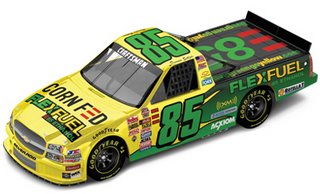GREEN-FUEL CARS: WHY THEY SELL AND WHY THEY DON'T
Consumers are apparently anxious to drive green cars though they have misimpressions and doubts.
Harris Interactive Reports: Two-Thirds of Adult Vehicle Owners are Familiar with Flexible Fuel Vehicles and More than Half are Interested in Purchasing One
Jen Cummings, July 26, 2006 (Harris Interactive)

- The most recent wave of the Harris Interactive AutoTECHCASTSM study reports that two-thirds of consumers surveyed are familiar with flexible fuel vehicles (vehicles can run on bio-fuels, including E85 which is comprised of 85% ethanol and 15% gasoline), and more than one-half are interested in purchasing such a vehicle. Though awareness levels are lower among younger consumers (ages 18 to 34) (59%), they are the group most likely to consider purchasing such a vehicle...
- Among consumers interested in purchasing flexible fuel vehicles, most (88%) cite a reduced dependency on petroleum as the leading reason for consideration...Harris Interactive finds that more than half of all those surveyed (53%) indicate that they are willing to pay more money for a vehicle that relies less on petroleum-based fuel...
- Consumers indicate they would choose a flexible fuel vehicle because of the improved fuel economy...However, ethanol-fueled vehicles will likely produce a slight decrease in fuel economy..."Consumers are assuming that a non-petroleum based fuel will result in better fuel economy, but that is not necessarily the case with ethanol...Still, beyond fuel economy, consumers are interested in flexible fuel vehicles for the impact they will have on the environment and that is certainly a benefit that this type of fuel can provide."

Plug-in hybrids: Not ready for primetime
Peter Valdes-Dapena, July 27, 2006 (CNNMoney.com)
- As car buyers search for more fuel-efficient alternatives, interest in plug-in hybrids is increasing.
- Ordinary hybrids, like the Toyota Prius, use power from the vehicle's gasoline engine to charge batteries that in turn power electric motors. When these hybrids were first introduced, people had a hard time understanding that they did not need to be plugged in to get needed electricity.
- Plug-in hybrids, however, can get their power from the same outlet that charges your cell phone or electric razor. That option greatly reduces reliance on gasoline...And a plug-in hybrid could drive on pure electric power for many miles before the gasoline engine would even need to turn on, offering the benefit of an electric car without the downside of limited range...
- So why are car companies still "working on it?"
1. Batteries: The biggest challenge is the battery...
2. Expectations: Consumers will also need to be educated about how the vehicles will work...
3. Cost: Currently, the cost difference between a hybrid vehicle and an identical non-hybrid version is about $3,000 to $5,000. The cost difference for a plug-in hybrid could be twice that...
- The two most difficult challenges facing researchers, for the time being, will be battery cost and life span...answers will likely come through more research and through simple creativity...








0 Comments:
Post a Comment
<< Home